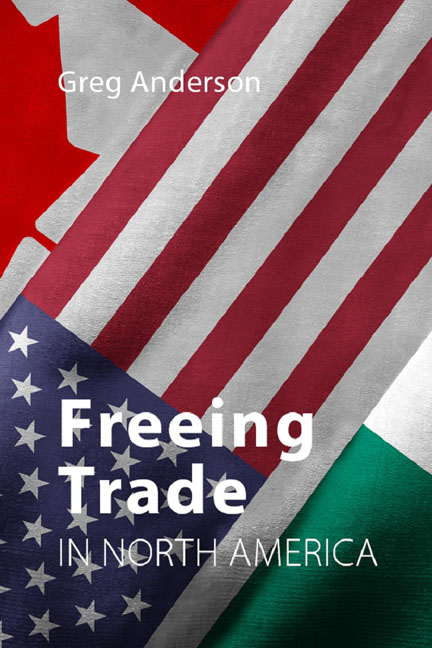Book contents
- Frontmatter
- Contents
- Introduction
- 1 The North American Idea
- 2 What the NAFTA is (and is not)
- 3 North America as Region
- 4 New Ground Broken and (Mixed?) Results
- 5 Much ado about Foreign Direct Investment
- 6 Governance in the NAFTA, or Lack Thereof?
- 7 Labour and the Environment
- 8 NAFTA 2.0: Did the Usmca Modernize Anything?
- Appendix 1 Spaghetti Bowl of Commitments by the 12 Trans-Pacific Partnership Signatories
- Appendix 2 US Trade in Goods and Services With NAFTA Partners, 1989–2017
- References
- Index
3 - North America as Region
Published online by Cambridge University Press: 24 August 2023
- Frontmatter
- Contents
- Introduction
- 1 The North American Idea
- 2 What the NAFTA is (and is not)
- 3 North America as Region
- 4 New Ground Broken and (Mixed?) Results
- 5 Much ado about Foreign Direct Investment
- 6 Governance in the NAFTA, or Lack Thereof?
- 7 Labour and the Environment
- 8 NAFTA 2.0: Did the Usmca Modernize Anything?
- Appendix 1 Spaghetti Bowl of Commitments by the 12 Trans-Pacific Partnership Signatories
- Appendix 2 US Trade in Goods and Services With NAFTA Partners, 1989–2017
- References
- Index
Summary
The discussion in Chapter 2 of what the NAFTA is and what it is not skirts a larger set of questions about what North America is. That sounds like a debate for a different book, but is not inconsequential here, since the answer to that question has fuelled the politics of the NAFTA itself. In the context of trade, North America is most simply expressed as the three parties to the NAFTA. Yet, geographically, North America is quite a bit broader. According to the National Geographic Society, the continent of North America
extends from the tiny Aleutian Islands in the northwest to the Isthmus of Panama in the south [and] includes the enormous island of Greenland in the north east and the small island countries and territories that dot the Caribbean Sea and western North Atlantic Ocean.
Moreover,
North America can be divided into five physical regions: the mountainous west, the Great Plains, the Canadian Shield, the varied eastern region, and the Caribbean. Mexico and Central America’s western coast are connected to the mountainous west, while its lowlands and coastal plains extend into the eastern region.
Neither Panama nor Greenland is part of the NAFTA, nor is the Caribbean. For a short time after the NAFTA’s completion, in 1994, the Free Trade Area of the Americas initiative contemplated the extension of NAFTA-like trade rules to most of the Western Hemisphere. Yet even the FTAA would not have included Cuba (democracy was a condition of entry) or Greenland, a semi-autonomous part of Denmark.
Within each of the NAFTA countries, for example, we can point to numerous examples of “regionalism” affecting domestic politics: the US Civil War and its long-term impact on the American South; Canada’s challenges with threatened independence by Quebec or with western alienation; or Mexico’s struggles with restive parts of its underdeveloped southern states. Each suggests a social, political or economic distinctiveness at the subnational level important for understanding the function of the larger polity. That all three have unique experiences with federalism suggests they remain in the midst of a grand experiment with how to knit large geographies and diverse populations into a cohesive national structure.
- Type
- Chapter
- Information
- Freeing Trade in North America , pp. 37 - 60Publisher: Agenda PublishingPrint publication year: 2019



